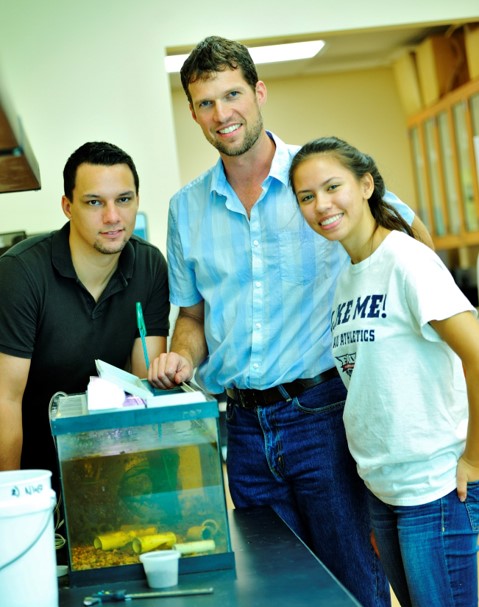 Dr. Nate Dorn of the Biological Sciences Department is best known for his work studying the ecology of freshwater crayfishes. He has recently returned from his sabbatical during which he re-started a research collaboration with Dr. Joel Trexler of Florida International University. This joint research project is investigating the responses of wetland crayfish populations to water-level variation in the Florida Everglades. “We’re working on a 20-year dataset and the project will probably be ongoing for another year before we generate new findings” said Dr. Dorn. In addition to this project, he also spent time developing proposals and initiating newly funded projects with federal and state agencies.
Dr. Nate Dorn of the Biological Sciences Department is best known for his work studying the ecology of freshwater crayfishes. He has recently returned from his sabbatical during which he re-started a research collaboration with Dr. Joel Trexler of Florida International University. This joint research project is investigating the responses of wetland crayfish populations to water-level variation in the Florida Everglades. “We’re working on a 20-year dataset and the project will probably be ongoing for another year before we generate new findings” said Dr. Dorn. In addition to this project, he also spent time developing proposals and initiating newly funded projects with federal and state agencies.
Research in the Dorn laboratory focuses on community ecology in wetland ecosystems. Hydrological conditions and nutrient levels in wetlands vary spatially and temporally and his research is studying animal population fluctuations and food web processes in response to such variation. Dr. Dorn says that “the driving contexts for these emphases are that 1) the effort to restore and rejuvenate the Everglades requires translating hydro-restoration into ecological outcomes (i.e., wetland functions) and 2) that I have an abiding interest in illuminating the influence of predation in communities.” Dr. Dorn is also involved in a small concerted effort with biologists in Germany that are studying a parthenogenetic crayfish.
Dr. Dorn currently has four funded research projects, with different temporal scopes, totaling more than $640K. The studies range from observational studies of White Ibis nestling diets from Lake Okeechobee and the southern Everglades (funded by the South Florida Water Management District and Everglades National Park) to a large replicated wetland experiment examining the effects of unnatural deep-water habitats on wading bird foraging. In addition, another ongoing multi-investigator study in the Dorn laboratory involves a landscape-scale experimental study of biological responses to flow-restoration in the Everglades, funded by the South Florida Water Management District as well. This study is a recently started project that will run for 3.5 years. The primary role of the Dorn laboratory in this collaborative project is to study the responses of macroinvertebrate communities to flow restoration.
The Dorn laboratory currently consists of three graduate students (one PhD, two MS) and usually has a couple of undergraduate DIS students assisting in the lab or field. He expects his laboratory to grow this coming year as he begins work on the flow restoration project. His current PhD student, Sergio Gonzalez, is studying amphibian and macroinvertebrate communities in wetlands at Jonathan Dickinson State Park. Sergio began working in Dr. Dorn’s laboratory to study his primary research interest, which is the role of wetland size and size fluctuation (flood pulsing) on the reproductive success of amphibians.
